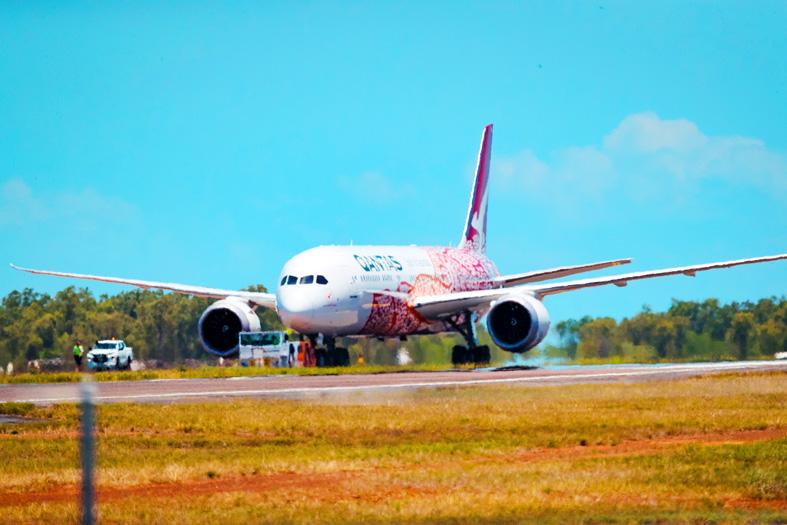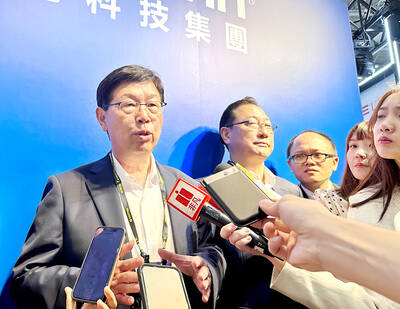Airlines have taken off in Asia and casino operators are enjoying a massive winning streak as news of a vaccine breakthrough yesterday fueled hopes that the world can finally begin returning to normal.
Japan Airlines Co shares soared by one-fifth, gaming giant Wynn Macau Ltd (永利澳門) rallied 10 percent and the owner of Singapore’s Universal Studios piled on 7 percent with traders betting on a recovery in the shattered tourism sector.
However, it was not all sunshine and light on trading floors as surgical glovemakers, tech giants and others that have benefited from the COVID-19 pandemic this year were tossed away.

Photo: EPA-EFE
Global markets have soared after US giant Pfizer Inc and its German partner BioNTech SE announced on Monday that a phase 3 trial showed their vaccine candidate was 90 percent effective in preventing COVID-19 infections.
In Asia, Singapore and Bangkok each soared more than 3 percent, with Mumbai and Jakarta up more than 1 percent. Tokyo, Hong Kong and Sydney also posted healthy gains.
Seoul and Wellington were also up, though Shanghai and Taipei fell.
Investors have been rushing back into embattled companies that have been ravaged by lockdowns imposed around the world to contain the disease, which has killed more than 1.2 million people.
“Bombed-out sectors such as aviation, travel, leisure, big oil and yes, our beloved banks, time-warped back to 2019 with giant rallies,” Oanda Corp senior analyst Jeffrey Halley said.
Airlines, suffering their worst-ever crisis, led the way, with Japan Airlines cruising up 20 percent, Singapore Airlines Ltd flying 14 percent, Qantas Airways Ltd jumping more than 8 percent and Cathay Pacific Airways Ltd (國泰航空) rocketing 13 percent on hopes that people will be able to get back in the air.
Bets on a rebound in the gambling sector ramped up as Hong Kong-listed Macau casino operators piled on the cash: Sands China Ltd (金沙中國) put on nearly 7 percent and Galaxy Entertainment Group Ltd (銀河娛樂集團) surged 5 percent.
Genting Singapore Ltd, which operates a casino and a Universal Studios theme park in the city-state, chalked up more than 7 percent.
Expectations that demand will pick up as people travel more pushed energy firms higher, with Hong Kong-listed CNOOC Ltd (中國海洋石油) up more than 12 percent and Papua New Guinea-focused Oil Search Ltd putting on 16 percent in Sydney.
Property developers were also winners, with Singapore-traded CapitaLand Ltd (凱德集團) putting on about 4 percent, while Hong Kong’s New World Development Co (新世界發展) moved up more than 5 percent.
However, there were also big losers — firms that have enjoyed large gains for most of the year thanks to the surge in demand for medical equipment to treat the novel coronavirus and technology from people stuck at home in lockdowns.
Malaysia’s Top Glove Corp Bhd, the world’s biggest maker of surgical gloves, fell more than 8 percent in Kuala Lumpur — though that was a small bite out of the more than 400 percent rise it has enjoyed since the start of the year.
Another glove manufacturer, Supermax Corp, cratered more than 8 percent in Malaysia, having racked up gains of more than 1,100 percent in the past 10 months.
Meanwhile, video gaming giants were deep in the red, just as the sector prepares for the holiday season and the next era of gaming consoles with Microsoft Corp putting its new Xbox on sale.
Sony Corp, which is to put its PlayStation 5 on shelves tomorrow, shed 3 percent in Tokyo, while rival Nintendo Co dropped more than 2 percent.
Nintendo has climbed about 25 percent this year, while Sony was up about 20 percent.
China’s Tencent Holdings Ltd (騰訊), one of the world’s largest video game makers, slipped more than 3 percent in Hong Kong — a fraction of the 60 percent gain it has enjoyed this year.
The breakthrough on a vaccine comes as several European nations endure fresh lockdowns to contain a second wave of the virus, which has infected nearly 51 million people globally and killed more than 1.2 million.
It has fanned hopes that the world economy can begin to get back on track after a year in which it has been shattered with tens of millions left jobless, companies going under and nations plunging into recession.
However, AxiCorp Financial Services Pty chief market strategist Stephen Innes warned that while there was much euphoria, there were also fears that US lawmakers would now pass a more modest stimulus program.
“Those heartening developments on the vaccine front are giving way to worries that lawmakers will pass a smaller stimulus package and the next move for central bankers will not be lower,” Innes said.
“It is just not the vaccine that will hold back US infrastructure spending. There is also some cynical objection from bipartisan politicians who are not keen to do anything to boost a political rival,” he said.

Taiwan Transport and Storage Corp (TTS, 台灣通運倉儲) yesterday unveiled its first electric tractor unit — manufactured by Volvo Trucks — in a ceremony in Taipei, and said the unit would soon be used to transport cement produced by Taiwan Cement Corp (TCC, 台灣水泥). Both TTS and TCC belong to TCC International Holdings Ltd (台泥國際集團). With the electric tractor unit, the Taipei-based cement firm would become the first in Taiwan to use electric vehicles to transport construction materials. TTS chairman Koo Kung-yi (辜公怡), Volvo Trucks vice president of sales and marketing Johan Selven, TCC president Roman Cheng (程耀輝) and Taikoo Motors Group

Among the rows of vibrators, rubber torsos and leather harnesses at a Chinese sex toys exhibition in Shanghai this weekend, the beginnings of an artificial intelligence (AI)-driven shift in the industry quietly pulsed. China manufactures about 70 percent of the world’s sex toys, most of it the “hardware” on display at the fair — whether that be technicolor tentacled dildos or hyper-realistic personalized silicone dolls. Yet smart toys have been rising in popularity for some time. Many major European and US brands already offer tech-enhanced products that can enable long-distance love, monitor well-being and even bring people one step closer to

RECORD-BREAKING: TSMC’s net profit last quarter beat market expectations by expanding 8.9% and it was the best first-quarter profit in the chipmaker’s history Taiwan Semiconductor Manufacturing Co (TSMC, 台積電), which counts Nvidia Corp as a key customer, yesterday said that artificial intelligence (AI) server chip revenue is set to more than double this year from last year amid rising demand. The chipmaker expects the growth momentum to continue in the next five years with an annual compound growth rate of 50 percent, TSMC chief executive officer C.C. Wei (魏哲家) told investors yesterday. By 2028, AI chips’ contribution to revenue would climb to about 20 percent from a percentage in the low teens, Wei said. “Almost all the AI innovators are working with TSMC to address the

FUTURE PLANS: Although the electric vehicle market is getting more competitive, Hon Hai would stick to its goal of seizing a 5 percent share globally, Young Liu said Hon Hai Precision Industry Co (鴻海精密), a major iPhone assembler and supplier of artificial intelligence (AI) servers powered by Nvidia Corp’s chips, yesterday said it has introduced a rotating chief executive structure as part of the company’s efforts to cultivate future leaders and to enhance corporate governance. The 50-year-old contract electronics maker reported sizable revenue of NT$6.16 trillion (US$189.67 billion) last year. Hon Hai, also known as Foxconn Technology Group (富士康科技集團), has been under the control of one man almost since its inception. A rotating CEO system is a rarity among Taiwanese businesses. Hon Hai has given leaders of the company’s six